Consumers and HVAC technicians often compare Rheem and Goodman as their products appear to fall into the same range.
We explore the offerings from both these companies to determine whether this is true or if the systems fall into similar categories but with significant differences.
Let’s start with a comparison between the two companies.
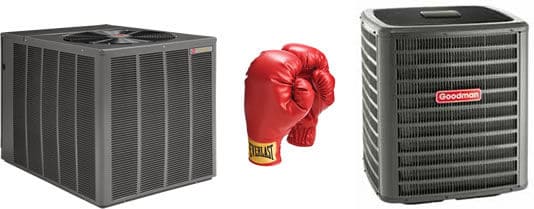
TL;DR: Rheem vs Goodman
Here’s a quick overview before we get to the detailed comparison.

Rheem
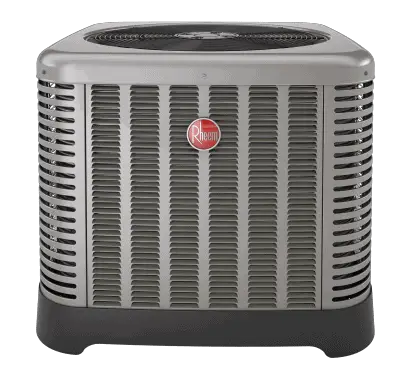
Goodman
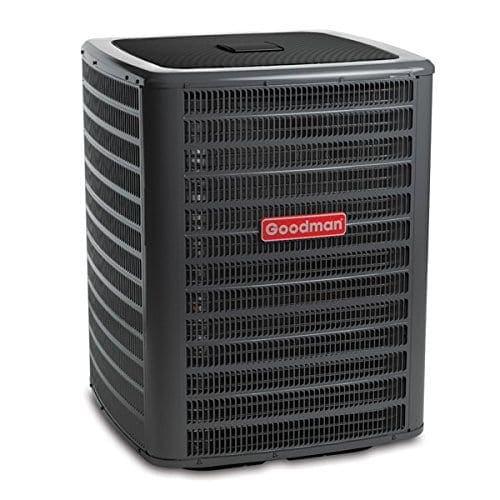
Strengths/Wins
Rheem
Durability
Innovation
Eco-friendliness
Goodman
Low cost
Warranties
Customer service
Downsides/Issues
Rheem
Price
Some unreliable models
Access to their systems by unqualified installers
Goodman
Lower SEER ratings
Lack of technology
Access to their systems by unqualified installers
Rheem Introduction
Since brothers Richard and Donald Rheem founded the company in 1925, Rheem has become a leader in heating and cooling products in North America and globally. In fact, they’re currently the largest manufacturer of water heating products in North America. The company has an ambitious goal to achieve zero waste by 2025 and seems to be on the way to achieving it.
A few impressive numbers include four factories with no waste to landfills and more than 2.5 million pounds of packaging eliminated per year. Sustainable products translate to long-term savings for the homeowner, even if you’re not concerned with the environment.
Rheem also has a history of innovation and firsts, being the first company to use scroll compressors throughout their lineup (1994). In 1997, they became the first company with a remote 14 SEER condenser. In 2009, they became the first company with a hybrid heat pump and water heater.
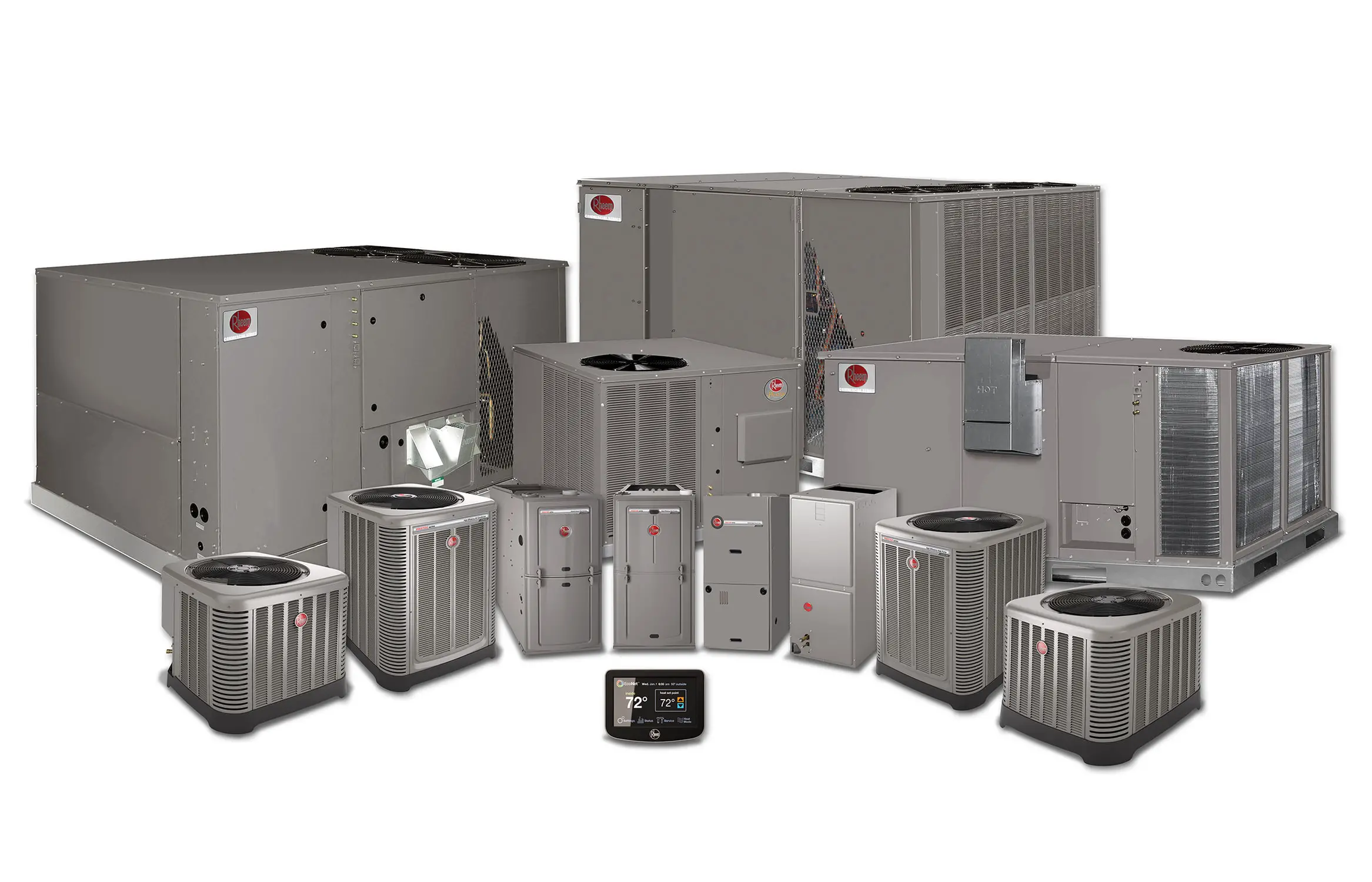
Goodman Introduction
Goodman is a much younger company, having first opened its doors in 1975 as a manufacturer of flexible ducts and plastic blade registers. Harold V. Goodman was an HVAC dealer with a dream of providing affordable HVAC equipment to households in the US and beyond.
With the closing of Janitrol in 1982, Goodman had the opportunity to enter the market, buying the equipment they needed to start supplying central air conditioners and heat pumps to the market. In 2012, Goodman was purchased by Japan’s Daikin Industries but remained an independent subsidiary.
Goodman is currently moving all its operations to its 4.1 million square foot facility near Houston, Texas. The Daikin Texas Technology Park is the single most significant investment made by Daikin in its history.
Like Rheem, Goodman is also committed to the environment, holding the ISO 14001 certification from Det Norske Veritas (DNV). Their building is LEED (Leadership in Energy and Environmental Design) Gold certified.
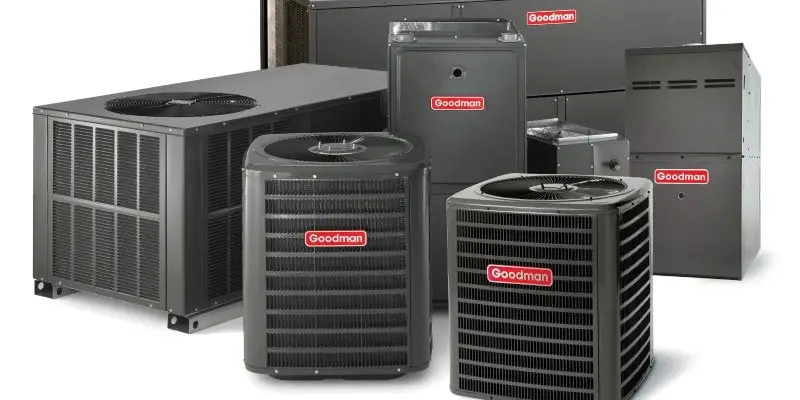
Company Comparison
We’ve provided a small summary below to help you compare a few characteristics of the two companies.
|
Rheem |
|
Goodman |
|---|---|---|
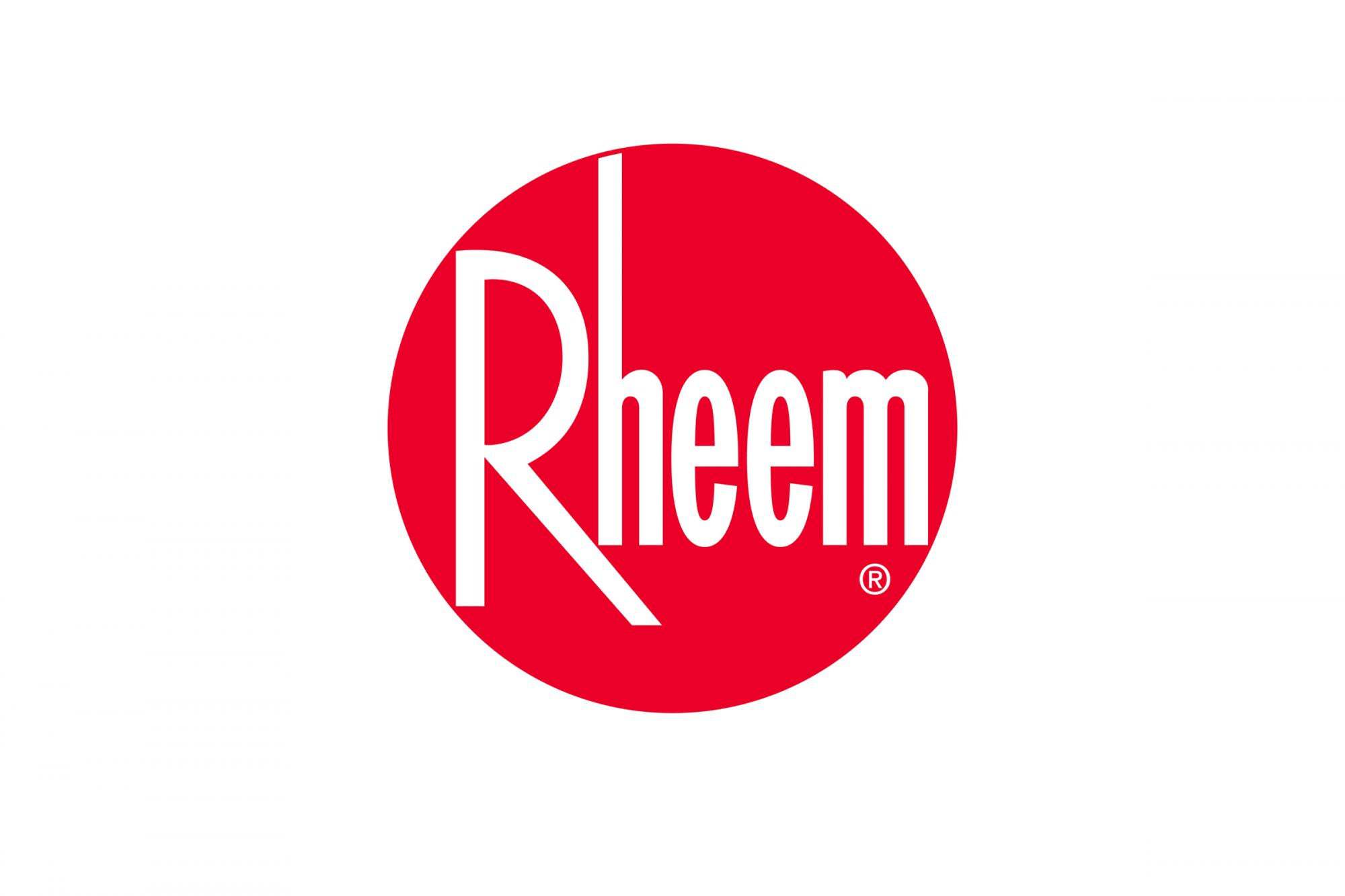 
| 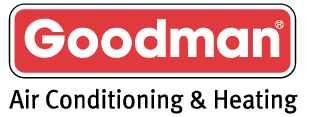 
| |
|
Georgia. Arkansas, Alabama, California, Mexico, Australia, China |
Where Are Their Products Made? |
Texas |
|
Rheem |
Who Manufactures Their Products? |
Goodman |
|
Paloma (Japan) |
Who Owns These Companies? |
Daikin (Japan) |
|
96 years (Founded in 1925) |
How Long Have They Been Around? |
46 years (Founded in 1975) |
|
10 years |
What’s their Warranty Like? |
Five-year limited warranty, extended to 10 years if you register within 60 days of installation. |
What Rheem Does Better Than Goodman
Rheem has been in the HVAC business for a long time and has grown with the technology, becoming an industry innovator. Rheem has a much more extensive product range, including air conditioners, water heaters, furnaces, and even pool heaters.
Rheem focuses on new technology and sustainability, so they produce some of the ACs with the highest SEER ratings and constantly improve the product performance with new “degrees of innovation.” Anyone looking for the latest technology and willing to try new ideas can look toward Rheem for their HVAC equipment.
Rheem offers decent warranties on all their equipment. Still, these warranties remain in line with the industry standard unless you buy grey-market equipment from the internet with a five-minute warranty and install it yourself.
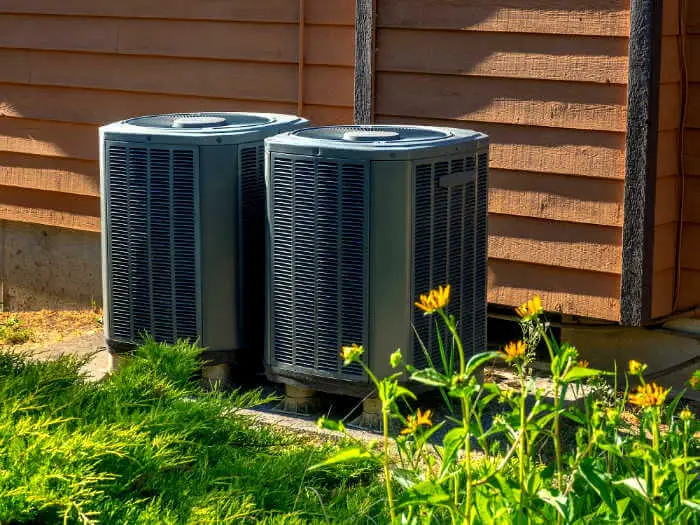
Both Rheem and Goodman have committed themselves to sustainability and supplying a greener product. Still, Rheem appears to have mastered the concept early, with Goodman trailing behind in SEER ratings and manufacturing processes. Rheem has a better research department and is more willing to apply new ideas and approaches to their manufacturing and design methods.
Rheem products give you the best that modern technology has to offer. The company is known for supplying good quality products. Sometimes they may be a little too eager to employ new ideas, so some products don’t live up to expectations. If you’re willing to pay a little extra for quality and innovation, Rheem is the brand to look at.
What Goodman Does Better Than Rheem
The two areas where Goodman trumps Rheem is customer service and price. Harold Goodman’s original vision was to supply affordable HVAC equipment to American households. The company has held true to its original ideals. You can count on a Goodman unit to cost less than its equivalent from any other well-known manufacturer.
Goodman has partially achieved this by centralizing all aspects of their operation in the Daikin Texas Technology Park, saving money and making communication between departments easier. They have also achieved economy by sacrificing innovation and relying on tried and tested technologies. As a result, their ACs generally lag behind competitors in some aspects.
The other area where Goodman excels, and this can also be attributed to the company’s founding principles, is customer service. By centralizing their operations, including parts, manufacturing, and customer service, the departments can communicate better and resolve any issues that may arise rapidly.
As we mentioned previously, Goodman has committed to sustainability and environmental awareness. The company is ISO 14001 certified, meaning they have processes to manage and mitigate environmental impact. Their offices also have LEED Gold certification.
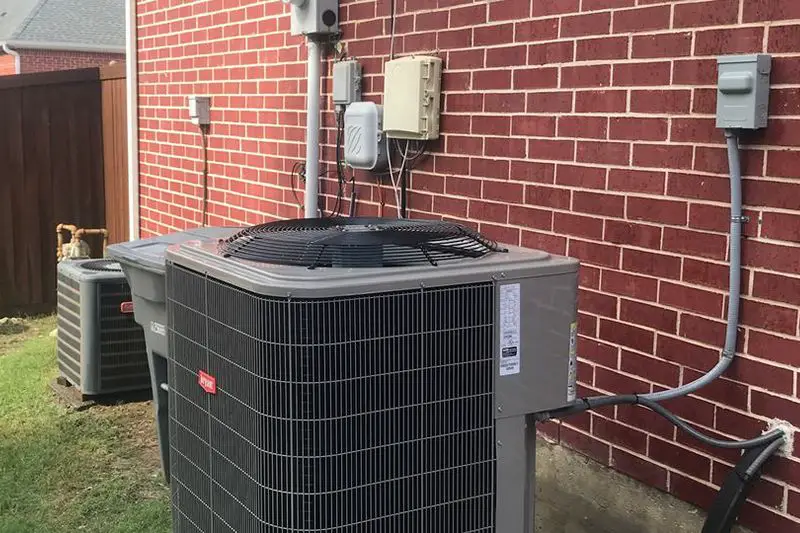
Like Rheem, Goodman offers a 10-year warranty on their units, they also provide a 10-year warranty on labor if you use an approved contractor.
Essentially, the warranty covers the parts and the installation for 10 years, which is better than the industry standard.
Goldman offers a no-frills HVAC with a proven track record and excellent customer service with the best warranty in the industry. If you’re happy with not having the latest technology, but prefer a unit with a proven track record and a lower price tag, then Goldman products fit the bill.
Rheem vs Goodman: Similarities
We’ve taken a close look at where each brand shines over the other. Let’s investigate some similarities.
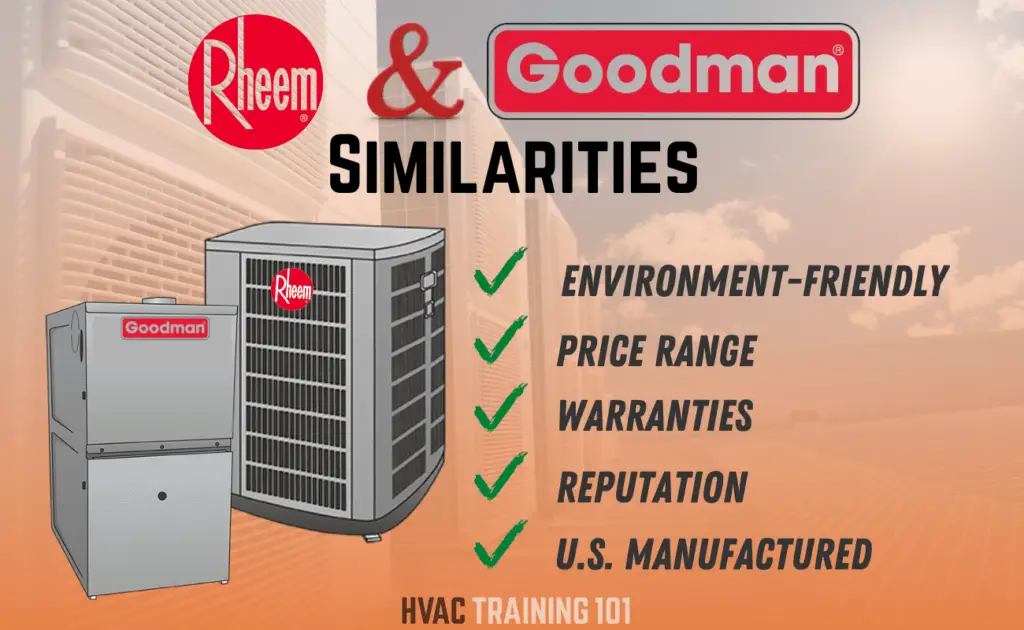
Environmental Concerns
The first similarity you notice between Rheem and Goodman isn’t their products but both company’s commitment to environmental sustainability. Both companies have made an effort to use more sustainable materials in the manufacturing process and manage their global impact on the environment. Each has taken a different approach to the problem with similar results.
Price Range
The HVAC units manufactured by these two companies also show some similarities. Although Goodman is generally cheaper, their premium products fall into the same price range as Rheem. The Rheem units have a slightly higher SEER rating.
Warranties
Both companies offer similar warranties on parts and manufacturing defects (10 years). However, Goodman includes a labor warranty if you use an approved installer. We feel that the labor warranty is Goodman’s attempt to minimize reputational damage from shoddy installations resulting in premature equipment failure and additional repair costs.
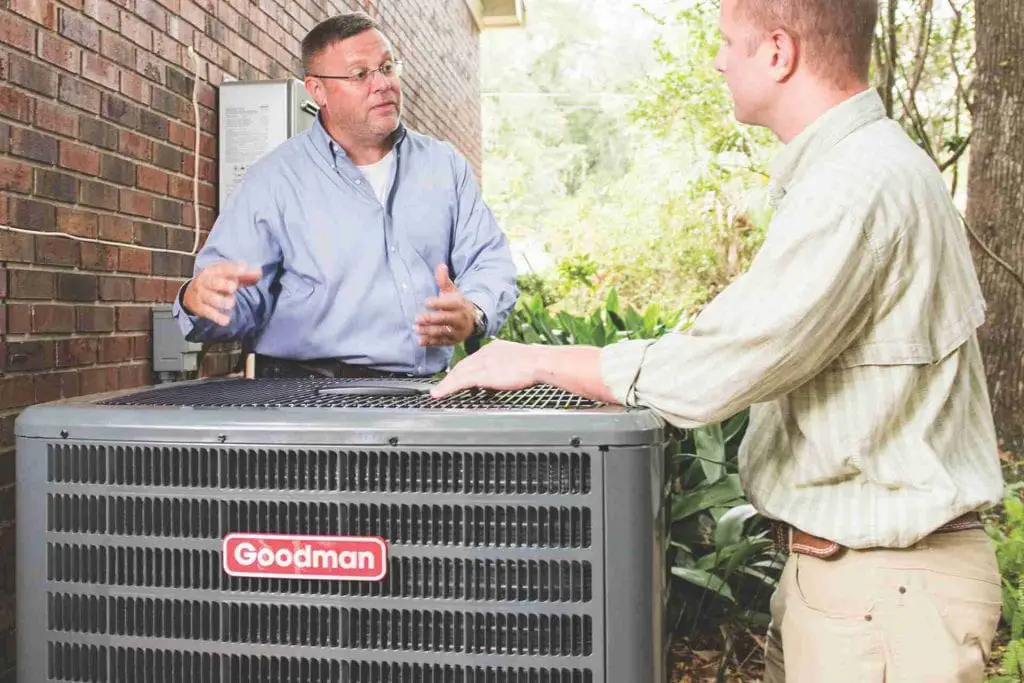
Reputation
Both companies have suffered some degree of reputational damage from poorly installed HVAC units. The availability of their products on the market has led to some installers tempting customers by offering low installation quotes but providing substandard workmanship.
US Manufacturing
Both Goodman and Rheem manufacture their own products in the United States. Rheem does have some factories outside the United States, but their main manufacturing base remains at home. These companies were started in America and still keep to their roots, even after being bought by Japanese groups.
Overview
You can expect either of these companies to supply you with a good quality product, made in the United States, for a reasonable price compared to their nearest competitors. Both manufacturers fill the mid-range niche in the HVAC market, with Goodman concentrating on the lower portion of the range and Rheem filling the upper part with many of their products intersecting in the areas of performance, reliability, and cost.
Rheem vs Goodman ACs
To give you a better comparison of the two brands, we’ll compare some of their products from the flagship and mid-tier ranges before looking at the budget models each has to offer.
Top-Tier Model: Rheem vs Goodman
First, we’ll look at the flagship models of the two brands to see how they compare. The top models for the two brands are the Rheem RA20 and Goodman GSXC18.
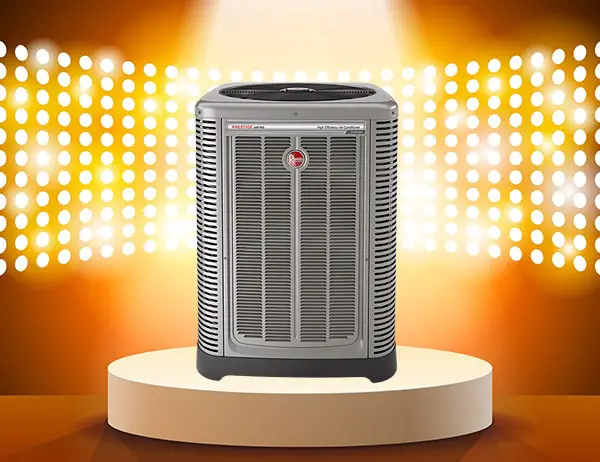
Rheem: RA20 (Prestige Series)
We’ve listed the main features of the RA20:
- Minimum SEER rating of 20 with a SEER of up to 20.5 (Minimum EER of 13)
- Variable-speed Copeland Scroll compressor
- Corrosion protection is provided by a powder coat paint system and rust-resistant screws tested with 1,500 hours of salt spray
- Unit is compatible with the Econet Smart Home System, which integrates all your home cooling, heating, and water heating needs into one network
- RA20 is also backed with a 10-year conditional replacement warranty and a 10-year conditional parts warranty
- The cost of this unit is around $1,850 for the system only and $3,075 fully installed
Goodman: GSXC18 (Premium Range)
We’ve tried to keep the comparison as fair as possible between the two models, so we’ve compared them using the same criteria:
- Minimum SEER rating is 18 with a SEER of up to 19 (Up to 14 EER)
- Variable-speed Copeland Scroll compressor
- Corrosion protection is provided by a baked-on powder coat finish and rust-resistant screws
- Factory-fitted with ComfortBridge controller to increase its efficiency by monitoring the system performance and making automatic adjustments
- GSXC18 is covered by a lifetime limited warranty on the compressor and a 10-year limited warranty on parts
- You can expect to pay around $1,550 for the system only and from $3,000 fully installed
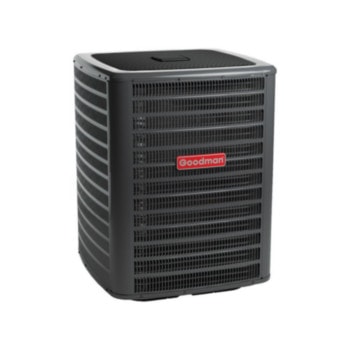
Mid-Range Model: Rheem vs Goodman
Now we’ll look at the mid-range models from these two brands and see how they compare. For Rheem, the mid-range model is the RA17 from the classic plus range, and for Goodman’s mid-range model, we chose the GSX16. (They also have a GSXC16 model with better efficiency performance).
Rheem: RA17 (Classic Plus Range)
The main features of the RA17 include the following:
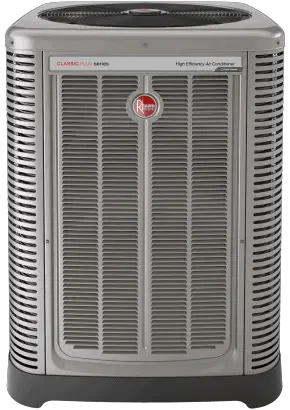
- Minimum SEER rating of 17 with a SEER of up to 18 (EER is rated at 13)
- A two-speed Copeland Scroll compressor
- Corrosion protection is provided by a powder coat finish and tested rust-resistant screws
- Mid-range model is also compatible with Rheem’s Econet Smart Home system and the controller combines all your water heating, home heating, and cooling needs into a single network, optimizing performance
- RA17 comes with a conditional parts warranty of 10 years
- The system’s price tag is around $1,450 for the unit only and from $2,740 fully installed.
Goodman: GSX 16
The GSX 16 includes the following features:
- A SEER rating of up to 16. (EER is rated at 13)
- Single-speed Copeland Scroll compressor.
- The cabinet is heavy-gauge galvanized steel, and the rust-resistant screws are tested for 500 hours of salt spray.
- There is no specific controller for this system. You’ll have to identify a suitable controller for your needs.
- The GSX 16 comes with a two-year limited replacement warranty and a 10-year parts limited warranty if the product is registered within 60 days of installation.
- Price is around $1,200 for the system, and you can have it fully installed from $2,400
Budget Model: Rheem vs Goodman
The entry-level products of these two brands are the RA13 for Rheem, and the GSX13 is Goodman’s entry-level system.
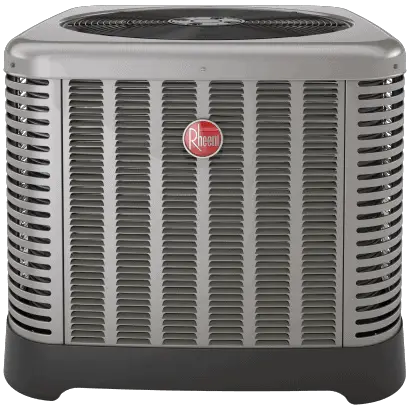
Rheem: RA13 (Classic Series)
Rheem’s RA13 is the most basic AC in their range and has the following features:
- RA13 achieves SEER ratings of between 13 and 15.5, with an EER between 11.5 and 13
- System utilizes a two-stage Copeland Scroll compressor
- Cabinet has a powder coat paint system for corrosion protection
- Rheem backs their product with a 10-year conditional parts warranty
- Rheem RA13 will set you back around $2,600 fully installed
Goodman: GSX13
The GSX13 is Goodman’s entry-level offering with the following features:
- GSX13 has a SEER of 14 and EER of 12
- System features a standard energy-efficient single-stage compressor
- Cabinet is heavy-gauge galvanized steel with a baked-on powder coat paint system with 500 hours of salt spray testing for anti-corrosion
- Goodman backs this product with a 10-year limited parts warranty and a two-year replacement warranty if the product is registered within 60 days of installation
- You can purchase this product fully installed for around $1,900
Conclusion
Goodman supplies low-priced ACs to the market but also backs them up with more generous warranties than Rheem. The customer service from Goodman is also excellent, so anyone looking for a budget system with decent guarantees and customer service should look to Goodman HVAC products.
Rheem incorporates more technology into their products, achieving better SEER ratings. Still, they also cost more, and the customer service can’t match Goodman’s service. Anybody looking for high-efficiency units and willing to pay the extra would be well-served looking at Rheem’s offerings.
People Also Ask
In this section, we’ll answer a few of the questions most people often ask regarding Rheem and Goodman products.
Goodman’s quality is superb compared to their pricing. Goodman supplies more basic units to the market.
Their energy efficiency is achieved through superior coils rather than electronic controllers and variable-speed compressors, making their energy ratings more consistent. Always use an approved installer to get the most out of any HVAC system.
The average lifespan of a Goodman system is 12-15 years. Still, like all AC units, this depends on professional installation and good maintenance practices.
Rheem’s ACs have an average lifespan of 15-20 years. Again, this is dependent on professional installation and best maintenance practices.
